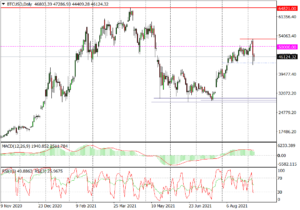Bitcoin at 100 dollars? Analysts say so!
On Wednesday, September 8 bitcoin rate was at the level of about 46,1 thousand. dollars, almost 10 percent. leaving the day before. For bank analysts Standard Chartered it must be a promotional course, because in just over a year they see bitcoin for 100. dollars. And that's not all.
Abstract forecast - are you sure?
Standard Chartered's cryptocurrency team forecasts that Bitcoin will rise to $ 2022 in early 100. dollars, and in the long run may increase even to 175 thousand. dollars. Where does such an increase come from? They assume that in the future:
"Bitcoin could become the dominant peer-to-peer payment for unbanked people."
Bitcoin quotes fell by almost 10 percent on Tuesday. to $ 46705 at the end of the day, taking the daily downhill to $ 42951,2 during the day. This is a significant step back below the psychological barrier of 50. dollars, interrupted the 1,5-month increases and in the optimistic scenario, it will stop bitcoin's increases for at least a few weeks.
In the pessimistic scenario, the market has turned and will now start moving towards the July lows. However, this scenario will be considered seriously only when the quotation below 44k permanently returns. dollars.

BTC / USD daily chart. Source: Tickmill
They go back to Standard Chartered's analysts, they also valued it Ethereum, the second most popular cryptocurrency. They believe it is "Structural valuation" is 26-35 thousand. dollars.






















![Forex Club – Tax 9 – Settle tax on a foreign broker [Download the Application] Forex Club - Tax 9](https://forexclub.pl/wp-content/uploads/2024/02/Forex-Club-Podatek-9-184x120.jpg?v=1709046278)
![Trading View platform – solutions tailored to the needs of traders [Review] trading view review](https://forexclub.pl/wp-content/uploads/2024/03/trading-view-recenzja-184x120.jpg?v=1709558918)
![How to connect your FP Markets account to the Trading View platform [Guide] fp markets trading view](https://forexclub.pl/wp-content/uploads/2024/02/fp-markets-trading-view-184x120.jpg?v=1708677291)
![How to invest in ChatGPT and AI? Stocks and ETFs [Guide] how to invest in chatgpt and artificial intelligence](https://forexclub.pl/wp-content/uploads/2023/02/jak-inwestowac-w-chatgpt-i-sztuczna-inteligencje-184x120.jpg?v=1676364263)


![WeWork – the anatomy of the collapse of a company valued at $47 billion [WeWork, part II] wework bankruptcy story](https://forexclub.pl/wp-content/uploads/2024/04/wework-bankructwo-historia-184x120.jpg?v=1711729561)
![Adam Neumann – the man who screwed up Softbank [WeWork, part AND] adam neumann wework](https://forexclub.pl/wp-content/uploads/2024/04/adam-neumann-wework-184x120.jpg?v=1711728724)





![How to transfer shares to another brokerage office [Procedure description] how to transfer shares to another brokerage house](https://forexclub.pl/wp-content/uploads/2024/03/jak-przeniesc-akcje-do-innego-biura-maklerskiego-184x120.jpg?v=1709556924)

![The most common mistakes of a beginner trader - Mr Yogi [VIDEO] Scalping - The most common mistakes of a beginner trader - VIDEO](https://forexclub.pl/wp-content/uploads/2024/03/Scalping-Najczestsze-bledy-poczatkujacego-tradera-VIDEO-184x120.jpg?v=1711601376)
![Learning patience: No position is also a position - Mr Yogi [VIDEO] Scalping - Learning patience - No position is also a position - VIDEO](https://forexclub.pl/wp-content/uploads/2024/03/Scalping-Nauka-cierpliwosci-Brak-pozycji-to-tez-pozycja-VIDEO-184x120.jpg?v=1710999249)
![When to exit a position and how to minimize losses - Mr Yogi [VIDEO] Scalping - When to exit a position and how to minimize losses - VIDEO](https://forexclub.pl/wp-content/uploads/2024/03/Scalping-Kiedy-wyjsc-z-pozycji-i-jak-minimalizowac-straty-VIDEO-184x120.jpg?v=1710336731)




![The most common mistakes of a beginner trader - Mr Yogi [VIDEO] Scalping - The most common mistakes of a beginner trader - VIDEO](https://forexclub.pl/wp-content/uploads/2024/03/Scalping-Najczestsze-bledy-poczatkujacego-tradera-VIDEO-300x200.jpg?v=1711601376)




